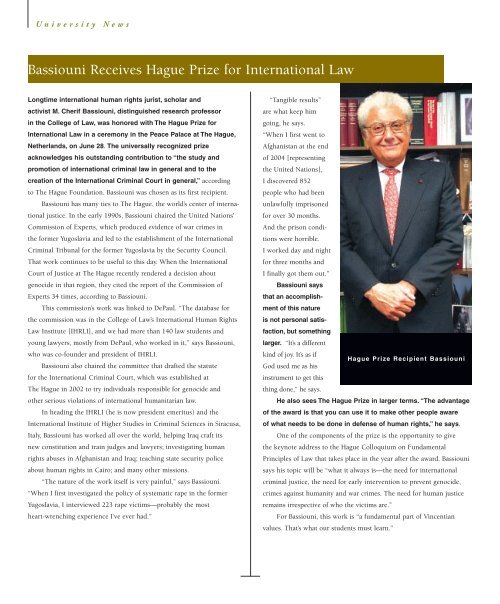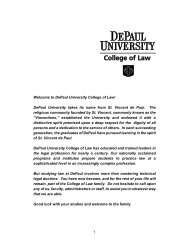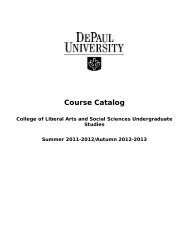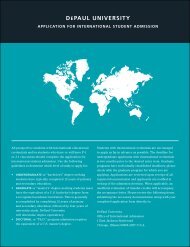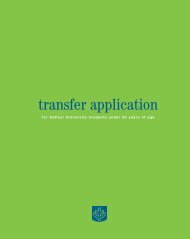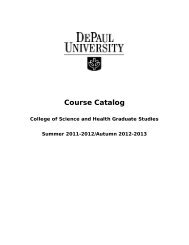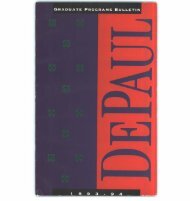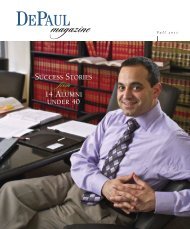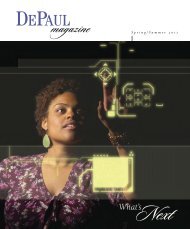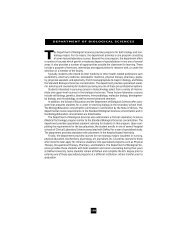You also want an ePaper? Increase the reach of your titles
YUMPU automatically turns print PDFs into web optimized ePapers that Google loves.
U n i v e r s i t y N e w s<br />
Bassiouni Receives Hague Prize for International Law<br />
Longtime international human rights jurist, scholar and<br />
activist M. Cherif Bassiouni, distinguished research professor<br />
in the College of Law, was honored with The Hague Prize for<br />
International Law in a ceremony in the Peace Palace at The Hague,<br />
Netherlands, on June 28. The universally recognized prize<br />
acknowledges his outstanding contribution to “the study and<br />
promotion of international criminal law in general and to the<br />
creation of the International Criminal Court in general,” according<br />
to The Hague Foundation. Bassiouni was chosen as its first recipient.<br />
Bassiouni has many ties to The Hague, the world’s center of international<br />
justice. In the early 1990s, Bassiouni chaired the United Nations’<br />
Commission of Experts, which produced evidence of war crimes in<br />
the former Yugoslavia and led to the establishment of the International<br />
Criminal Tribunal for the former Yugoslavia by the Security Council.<br />
That work continues to be useful to this day. When the International<br />
Court of Justice at The Hague recently rendered a decision about<br />
genocide in that region, they cited the report of the Commission of<br />
Experts 34 times, according to Bassiouni.<br />
This commission’s work was linked to <strong>DePaul</strong>. “The database for<br />
the commission was in the College of Law’s International Human Rights<br />
Law Institute [IHRLI], and we had more than 140 law students and<br />
young lawyers, mostly from <strong>DePaul</strong>, who worked in it,” says Bassiouni,<br />
who was co-founder and president of IHRLI.<br />
Bassiouni also chaired the committee that drafted the statute<br />
for the International Criminal Court, which was established at<br />
The Hague in 2002 to try individuals responsible for genocide and<br />
other serious violations of international humanitarian law.<br />
In heading the IHRLI (he is now president emeritus) and the<br />
International Institute of Higher Studies in Criminal Sciences in Siracusa,<br />
Italy, Bassiouni has worked all over the world, helping Iraq craft its<br />
new constitution and train judges and lawyers; investigating human<br />
rights abuses in Afghanistan and Iraq; teaching state security police<br />
about human rights in Cairo; and many other missions.<br />
“The nature of the work itself is very painful,” says Bassiouni.<br />
“When I first investigated the policy of systematic rape in the former<br />
Yugoslavia, I interviewed 223 rape victims—probably the most<br />
heart-wrenching experience I’ve ever had.”<br />
“Tangible results”<br />
are what keep him<br />
going, he says.<br />
“When I first went to<br />
Afghanistan at the end<br />
of 2004 [representing<br />
the United Nations],<br />
I discovered 852<br />
people who had been<br />
unlawfully imprisoned<br />
for over 30 months.<br />
And the prison conditions<br />
were horrible.<br />
I worked day and night<br />
for three months and<br />
I finally got them out.”<br />
Bassiouni says<br />
that an accomplishment<br />
of this nature<br />
is not personal satisfaction,<br />
but something<br />
larger. “It’s a different<br />
kind of joy. It’s as if<br />
Hague Prize Recipient Bassiouni<br />
God used me as his<br />
instrument to get this<br />
thing done,” he says.<br />
He also sees The Hague Prize in larger terms. “The advantage<br />
of the award is that you can use it to make other people aware<br />
of what needs to be done in defense of human rights,” he says.<br />
One of the components of the prize is the opportunity to give<br />
the keynote address to the Hague Colloquium on Fundamental<br />
Principles of Law that takes place in the year after the award. Bassiouni<br />
says his topic will be “what it always is—the need for international<br />
criminal justice, the need for early intervention to prevent genocide,<br />
crimes against humanity and war crimes. The need for human justice<br />
remains irrespective of who the victims are.”<br />
For Bassiouni, this work is “a fundamental part of Vincentian<br />
values. That’s what our students must learn.”


